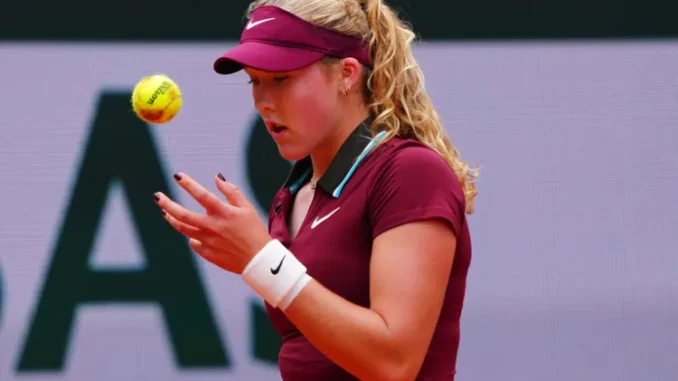
The opening round of the Berlin Ladies Open delivered a stunning upset, as the prodigious Mirra Andreeva, despite her meteoric rise and top-10 ranking, suffered a surprising defeat at the hands of Poland’s Magdalena Frech. This early exit marks a significant setback for the 18-year-old Russian as she navigates the tricky transition to the grass-court season, especially with Wimbledon on the horizon.
Andreeva, currently ranked World No. 6, entered the Berlin tournament as the sixth seed, carrying the weight of high expectations following an impressive 2025 season that has seen her claim two WTA 1000 titles and establish herself firmly among the elite. However, her campaign in the German capital was cut short by the World No. 25, Magdalena Frech, who staged a remarkable comeback to win 2-6, 7-5, 6-0 in a match lasting two hours and eight minutes.
The match began favorably for Andreeva, who seemed to be in complete control during the first set. Her powerful groundstrokes and aggressive approach allowed her to comfortably secure the set 6-2, showcasing the form that has propelled her up the rankings. Many in the tennis world expected her to close out the match efficiently, particularly given her previous successes against Frech this year, having defeated the Pole twice already in 2025.
However, the tide began to turn dramatically in the second set. Frech, a seasoned competitor who had previously struggled against top-10 opponents, found a new gear. Despite trailing 1-4 and facing two breaks, the Polish player displayed immense grit, clawing her way back into the set. Andreeva’s composure, a hallmark of her early success, appeared to erode as the set progressed. Her unforced error count began to climb, and a crucial break of serve by Frech at 5-5 proved pivotal, allowing her to clinch the second set 7-5.
The momentum shift was palpable, and the third set saw a complete collapse from Andreeva. Frech, buoyed by her comeback, capitalized on every opportunity. The young Russian struggled significantly with her service games, winning just 32% of her service points in the decider. She conceded three consecutive breaks, and in a turn of events that no one predicted, Mirra Andreeva suffered a “bagel,” losing the final set 6-0. This marked the first time in her professional career that Andreeva had lost a deciding set with such a lopsided scoreline.
For Magdalena Frech, this victory was a momentous occasion, representing only her second career win against a top-10 opponent. “It’s always tough to play against Top 10 players, especially Mirra,” Frech stated on court after the match. “She’s a great fighter, she’s playing really great tennis. I knew from the beginning that it’s going to be a very tough match.”1 Describing her comeback, she added, “I tried to focus more on my service games, to be more patient. I tried to be more aggressive from the second set. When I was at 5-5, 0-30, I said, ‘Come on, you can do better! You can do something, just play freely.’ And that was the2 key.”
This unexpected loss for Andreeva raises questions about her adaptation to grass-court tennis. While her talent is undeniable, her record on grass has been less consistent, with this being her third consecutive first-round loss on the surface in as many appearances over the last year. Despite being coached by former Wimbledon champion Conchita Martínez, who possesses invaluable grass-court expertise, Andreeva was unable to leverage this advantage in Berlin.
The defeat also follows a somewhat disappointing quarter-final exit at Roland Garros to a wildcard entrant, hinting at potential challenges when facing unexpected pressure or adapting to specific conditions. While Andreeva has proven her ability to defeat top players on hard courts, including victories over Aryna Sabalenka and Iga Swiatek this season, the nuances of grass, with its faster pace and lower bounce, continue to pose a learning curve for the young star.
As the grass-court season continues, Andreeva will have another opportunity to find her footing at the upcoming WTA 500 tournament in Bad Homburg. For now, however, the upset in Berlin serves as a stark reminder that even the most promising talents can face unexpected hurdles, particularly on a surface that demands precise adaptation and a unique set of skills. The tennis world will be watching closely to see how the young Russian responds to this “shock of the day” as she continues her journey toward consistent Grand Slam contention.
Leave a Reply